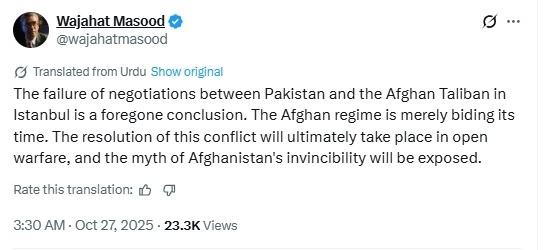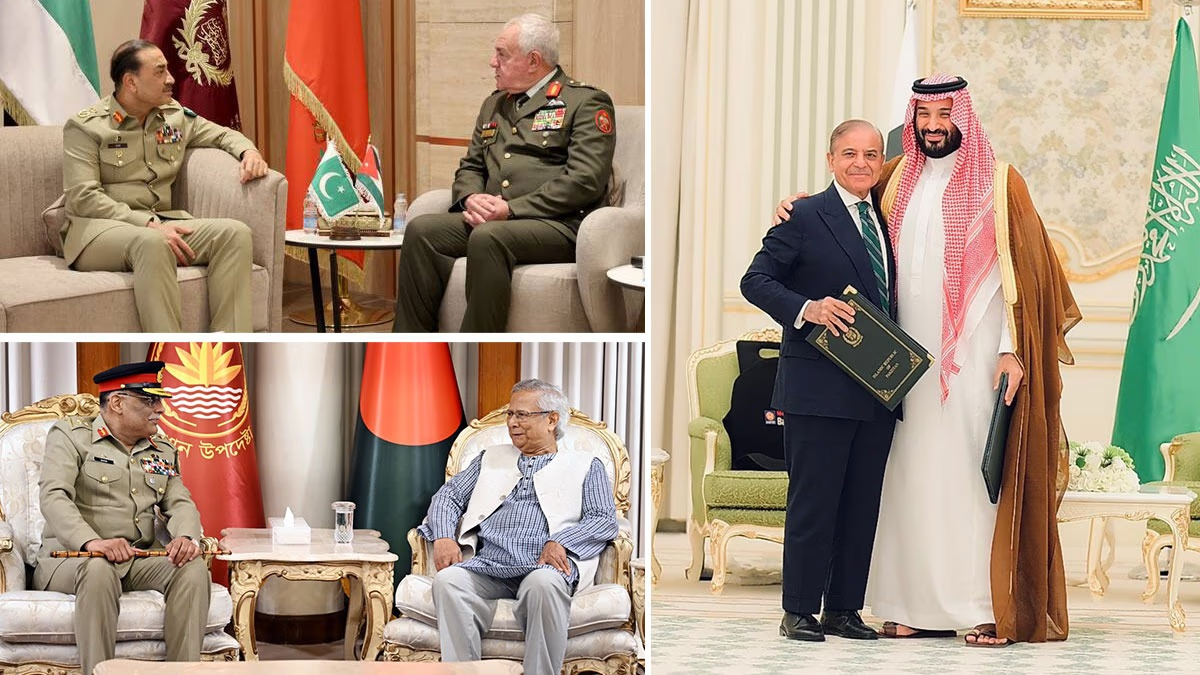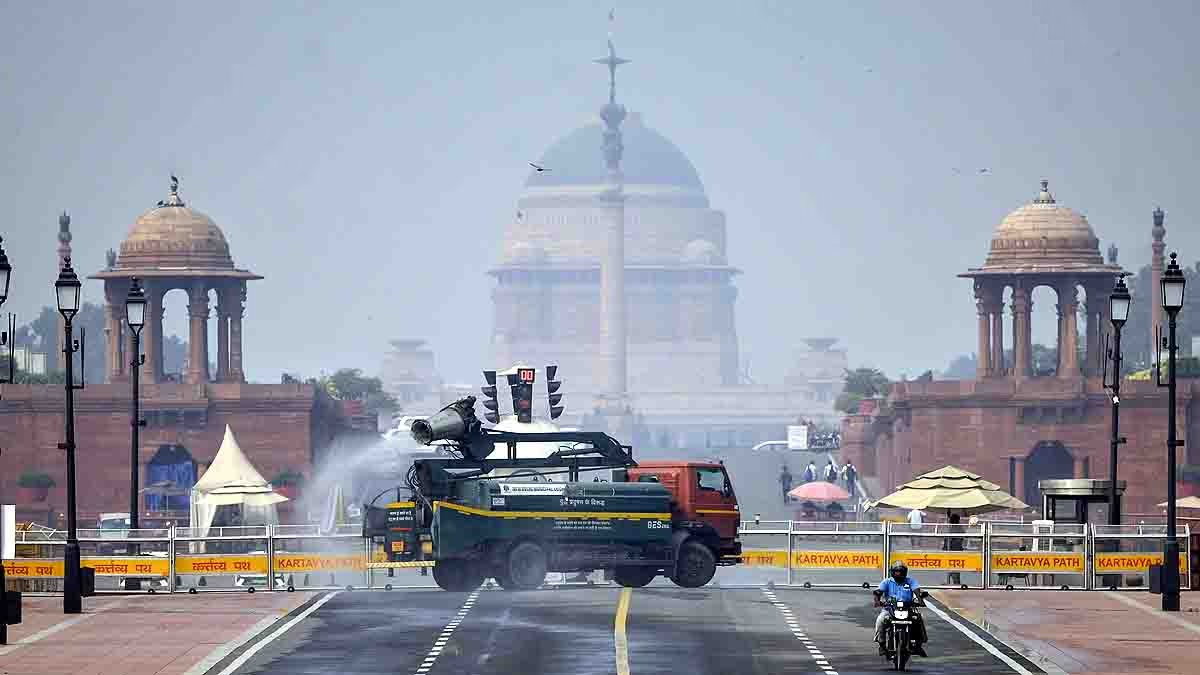These days, Pakistan's political leadership is in Saudi Arabia. Prime Minister Shahbaz Sharif is currently attending the Future Investment Initiative (FII9) summit in Riyadh, engaging in several bilateral meetings with Saudi leaders. Pakistan's Army Chief, Field Marshal Asim Munir, is stationed just a few hundred miles away in Jordan, while General Mirza Shamshad Beg, the second-in-command in Pakistan's military, is weaving diplomacy in Bangladesh, neighboring India.
The focus of these officers and leaders is fixed on Istanbul, where Pakistan has been holding talks for two days to appease its estranged neighbor, Afghanistan. Essentially, Pakistan's top leadership is currently abroad.
In October 2025, Afghan-Pakistan tensions peaked when Pakistan launched airstrikes in Kabul and Kandahar. In retaliation, the Afghan Taliban attacked Pakistani posts at the border, resulting in dozens of soldier casualties.
Ultimately, a fragile ceasefire was brokered by Qatar and Turkey between the two nations.
However, tensions remain between the two countries, and a war could spark at any moment. Tehrik-e-Taliban attacked Pakistan over 600 times in 2025, marking this decade's highest threat level.
This conflict jeopardizes Pakistan's internal security, thus compelling Pakistan to seek peace with Afghanistan by all means necessary. The Taliban, having troubled superpowers like Soviet Russia and the USA, looks to dismantle Pakistan.
In this context, Pakistan's foreign policy focuses on multi-front balancing: strengthening western border security, handling economic crises, and increasing influence in South Asia. These leaders' journeys are part of this strategic plan. Pakistan seeks to strengthen alternative alliances amid the uncertainty sparked by Afghan tensions.
The Taliban is not yielding to Pakistan's terms.
What Pakistan Wants from the Taliban
But the Taliban refuses to bow down. During talks in Istanbul, the Afghan Taliban would not entertain Pakistan's unilateral terms. According to Dawn, Pakistani security officials stated after nearly nine hours of intense discussions that their delegation had presented its “final position”, emphasizing that the Taliban regime should adopt concrete and verifiable steps to eliminate cross-border terrorism from Afghanistan.
A senior Pakistani security official declared, "Pakistan has made it clear that the sanctuary Taliban provide to terrorists is unacceptable."
But the Taliban outright rejected Pakistan's claims, calling them 'irrational and detached from ground realities.'
It is evident that Pakistan wants Afghanistan to completely halt alleged terrorist attacks against it from Afghan territories.
India Desires the Same from Pakistan
Pakistan claims attacks on its soil have links to Afghanistan, claims India does not endorse. But when India demands Pakistan halt terrorist attacks from within its borders on Indian territories, including Jammu and Kashmir, Pakistan becomes silent. India has provided Islamabad with evidence of the involvement of Pakistani agencies in terrorist attacks on its soil. However, Pakistan invariably dismisses these allegations and never acts against those elements.
The world acknowledges evidence of Pakistan's involvement in terrorist activities. The UN has already declared Lashkar chief Hafiz Saeed a terrorist, and Maulana Masood Azhar's terrorist activities are well-known worldwide. Yet, Pakistan remains silent.
Now, as Pakistan struggles to force the Afghan Taliban to acknowledge its alleged terrorist activities, it is feeling the same pain India has suffered for years.
Pakistan is now threatening the Taliban, saying its stance is not in the interest of Afghanistan, Pakistan, or South Asia.
The Solution Lies in Open War
Pakistan sees clearly that the Taliban will not consent to its arbitrary conditions. Notably, Afghanistan too has asked Pakistan to halt attacks on Afghanistan from within its borders.

Source: aajtak
Senior Pakistani journalist Wajahat Masood wrote on X about the anticipated failure of the peace talks in Istanbul between Pakistan and the Afghan Taliban. He remarked, "The failure of the Pakistan-Afghan Taliban talks in Istanbul is a pre-determined conclusion. Afghan governance is merely waiting for the right moment. The resolution to this conflict will eventually unfold in open warfare, debunking the myth of Afghanistan's invincibility."
In such a scenario, Pakistan is making repeated visits to Saudi Arabia, its major partner in the Arab region. Prime Minister Shahbaz Sharif has visited Saudi Arabia thrice in three months – in August, September, and October – seeking security assurances.
Meanwhile, Pakistan's Army Chief, Field Marshal Aseem Munir, discussed military cooperation with King Abdullah II of Jordan and Major General Yousef Huneiti, the Joint Chief of Staff's chairman.
Officially, talks focused on enhancing cooperation between Jordan and Pakistan, but the strategic landscape of South Asia was a crucial part of the discussion.
Simultaneously, Pakistan Military’s number two commander, General Sahir Shamshad Mirza, met with Mohammad Yunus, head of Bangladesh's interim government. The meeting aimed at discussing strategic and defense issues.




